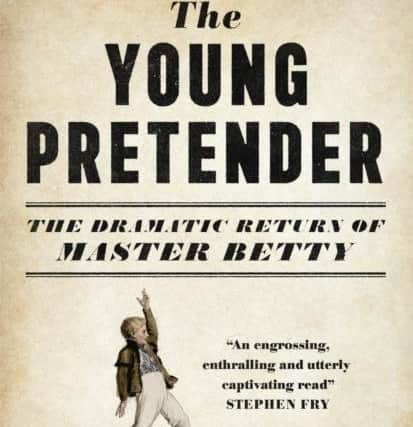Book review: The Young Pretender, by Michael Arditti


The exploitation and abuse of child and teenaged actors is nothing new, even if now one thinks first of Hollywood and the pop music industry. It’s as old as theatre and one wonders sometimes about Shakespeare’s boy actors. What became of those who starred as Cleopatra, Viola and Rosalind? Other questions present themselves. How to handle fame at an early age? How to handle its withering? These are at the heart of Michael Arditti’s entrancing and disturbing new novel.
Written in the first person it is the story of Master William Betty who as a 12 year-old boy actor took first the provinces and then London by storm in the first years of the 19th century. Hailed as “the infant Garrick” and “the Young Roscius” he played Hamlet, Richard III and other Shakespearean roles as well as popular melodrama, achieving perhaps his greatest success as Norval, the young hero of John Home’s Douglas. Beautiful and graceful, he also achieved a great social success, admired by royalty and the Prime Minister William Pitt, while also arousing the jealous resentment of many in the theatre.
Advertisement
Hide AdThese triumphs are in the past when the novel begins with Mister – no longer Master – Betty embarking on a comeback six years older, ten inches taller and considerably stouter than when he retired and went to Cambridge University. His name and reputation will secure him engagements, but where people once flocked to the theatre in wonder, now they come only from curiosity, and where once he delighted, he is now soon met with disappointment or indifference.


He is driven to examine the days of his glory and to confront the dark side of his triumph. Did his father ruthlessly exploit him? Was his admired tutor, who taught him his craft, also an abuser? Was his celebrity spurious? Were, he comes to wonder, his detractors right? At last he thinks, “I was not an actor but a sideshow.” It is a moving and disturbing story, and Arditti tells it with understanding and engaging sympathy.
He also gives a rich picture of the theatre of the time, of inadequate and wooden rehearsals, and sketches out some truly dreadful-sounding plays in which Master Betty delighted his audiences. It is also a rich social picture, sometimes a harrowing one as when, for example, Master Betty is taken to view the lunatics in Bedlam. This, then, is a historical novel, and an admirably researched and re-imagined one, with moving scenes as when the mature Betty makes a greenroom visit to the veteran actress, Mrs Jordan, long time mistress of the future William IV, mother of his ten children, two of whom were friends and playmates of Master Betty in his days of fame. The theatre, as she knows, is a harsh place where much that glitters is very far from being gold.
One is left wondering, like the narrator, whether his fame was built only on his curiosity value, whether he was indeed only a sideshow. Surely not. There was surely something genuine and much that was moving there. We have all seen remarkable performances by children and adolescents, and reading this novel I remember that one of the best Lady Macbeths I have seen was a boy of 15 in my house at school.
Michael Arditti is a novelist who has always set himself new challenges and has not cared to repeat himself. His novels are unpredictable, the one before this being, for example, the story of the Biblical King David. For this reason I suspect he has never has the popularity his talent should entitle him to. You might say his work is uneven and he doesn’t always succeed in what he sets out to do. You might say that sometimes his ambition – for he is always ambitious – over-reaches itself and falls on the other side. But he is never dull. He is always at the very least interesting, and this is no mean thing to be. Sometimes he meets with a complete success, and The Young Pretender is surely that. He may never be fashionable, but that is no great matter. Much that is fashionable is poor stuff. I never open one of Arditti’s novels without the expectation of pleasure, and am almost always well rewarded.
The Young Pretender, by Michael Arditti, Arcadia Books, 185pp, £14.99
A message from the Editor:
Advertisement
Hide AdThank you for reading this article. We're more reliant on your support than ever as the shift in consumer habits brought about by coronavirus impacts our advertisers.
If you haven't already, please consider supporting our trusted, fact-checked journalism by taking out a digital subscription at https://www.scotsman.com/subscriptions